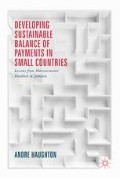Abstract
In concluding, the Jamaican economy has found itself in a deadlock in trying to maintain macroeconomic stability as well as increasing economic growth and productivity necessary for sustained economic development. Declining labor productivity and slow infrastructural development coupled with government inefficiency and ulterior motives has prevented the country from entering a steady-state growth path towards development. Jamaica’s aim to achieve stability, growth and development should be guided by clear plans of linking short-run stability and growth tactics to long-run developmental strategic objectives. Although it appears to be in a deadlock, Jamaica has made significant strides in the right direction under the supervision of the International Monetary Fund (IMF), the World Bank, the Inter-American Development Bank (IDB) and other multilateral lenders since 2013.
Access this chapter
Tax calculation will be finalised at checkout
Purchases are for personal use only
Notes
- 1.
The IMF reduced Jamaica’s primary fiscal balance from 7.5 to 7.25 percent of GDP as of November 2015.
References
Alejandro, D.C.F. (1963). A note on the impact of devaluation and the redistributive effect. Journal of Political Economy, 71(6), 571–580.
Krugman, P., & Taylor, L. (1978). Contractionary effects of devaluation. Journal of International Economics, 8(3), 445–456.
Lewis, A. (1954). Economic development with unlimited supply of labour. The Manchester School, 22, 139–191.
Rochester, L., (2009). Revisiting current account sustainability measures for Jamaica an assessment. Bank of Jamaica Working Paper.
Saibene, G., & Sicouri, S. (2012). The effects of currency devaluation on economic growth in developing countries, the role of foreign currency denominated debt. Atlantic Economic Journal, 40, 191–209.
Van Wijnbergen, S. (1986). Exchange rate management and stabilization policies in developing countries. In Sebastian, E., & Ahmed, L. (Eds.), Economic adjustment and exchange rate in developing countries (Chapter 2, pp. 17–42). University of Chicago Press.
Author information
Authors and Affiliations
Rights and permissions
Copyright information
© 2017 The Author(s)
About this chapter
Cite this chapter
Haughton, A. (2017). Concluding Remarks and Policy Recommendation. In: Developing Sustainable Balance of Payments in Small Countries. Palgrave Macmillan, Cham. https://doi.org/10.1007/978-3-319-53031-4_10
Download citation
DOI: https://doi.org/10.1007/978-3-319-53031-4_10
Published:
Publisher Name: Palgrave Macmillan, Cham
Print ISBN: 978-3-319-53030-7
Online ISBN: 978-3-319-53031-4
eBook Packages: Economics and FinanceEconomics and Finance (R0)

